Individual Research Proposal: PUBH6013 - Qualitative Research Methods
VerifiedAdded on 2022/09/08
|10
|2029
|22
Report
AI Summary
This research proposal investigates the role of nurses in promoting weight loss among Australian adults. Employing a qualitative approach, specifically phenomenology, the study aims to understand patients' experiences. The proposal includes a review of relevant literature, a clearly defined research question, and outlines the methodology involving semi-structured interviews with Australian adults. It details the interview questions, ethical considerations such as confidentiality, anonymity, and informed consent, and addresses potential risks of bias. The author reflects on their personal motivation for exploring the topic and provides a comprehensive overview of the research design, making this a valuable resource for students studying qualitative research methods in public health, with a focus on obesity management and the role of healthcare professionals. This research proposal is available on Desklib, providing a useful resource for students.
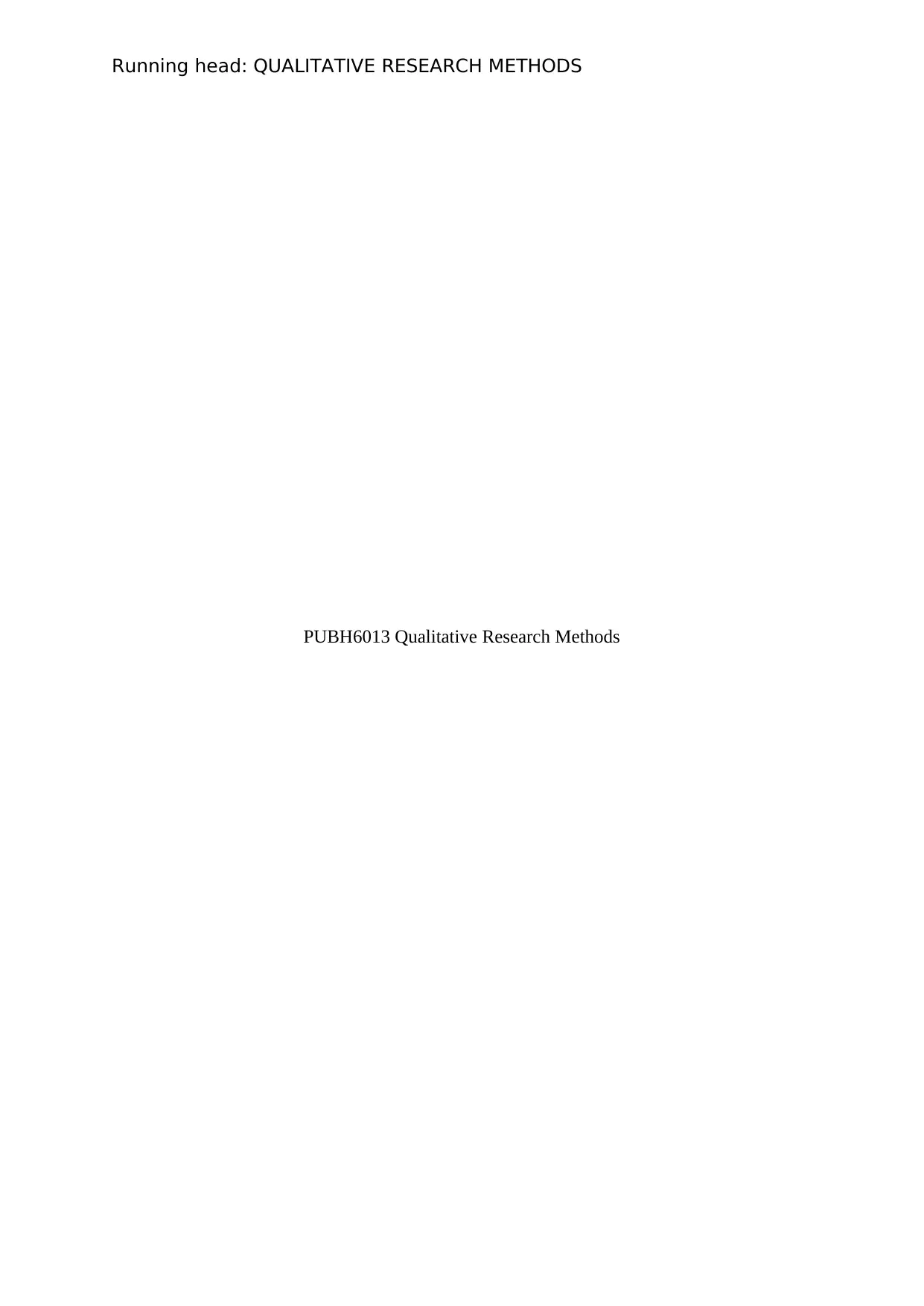
Running head: QUALITATIVE RESEARCH METHODS
PUBH6013 Qualitative Research Methods
PUBH6013 Qualitative Research Methods
Paraphrase This Document
Need a fresh take? Get an instant paraphrase of this document with our AI Paraphraser
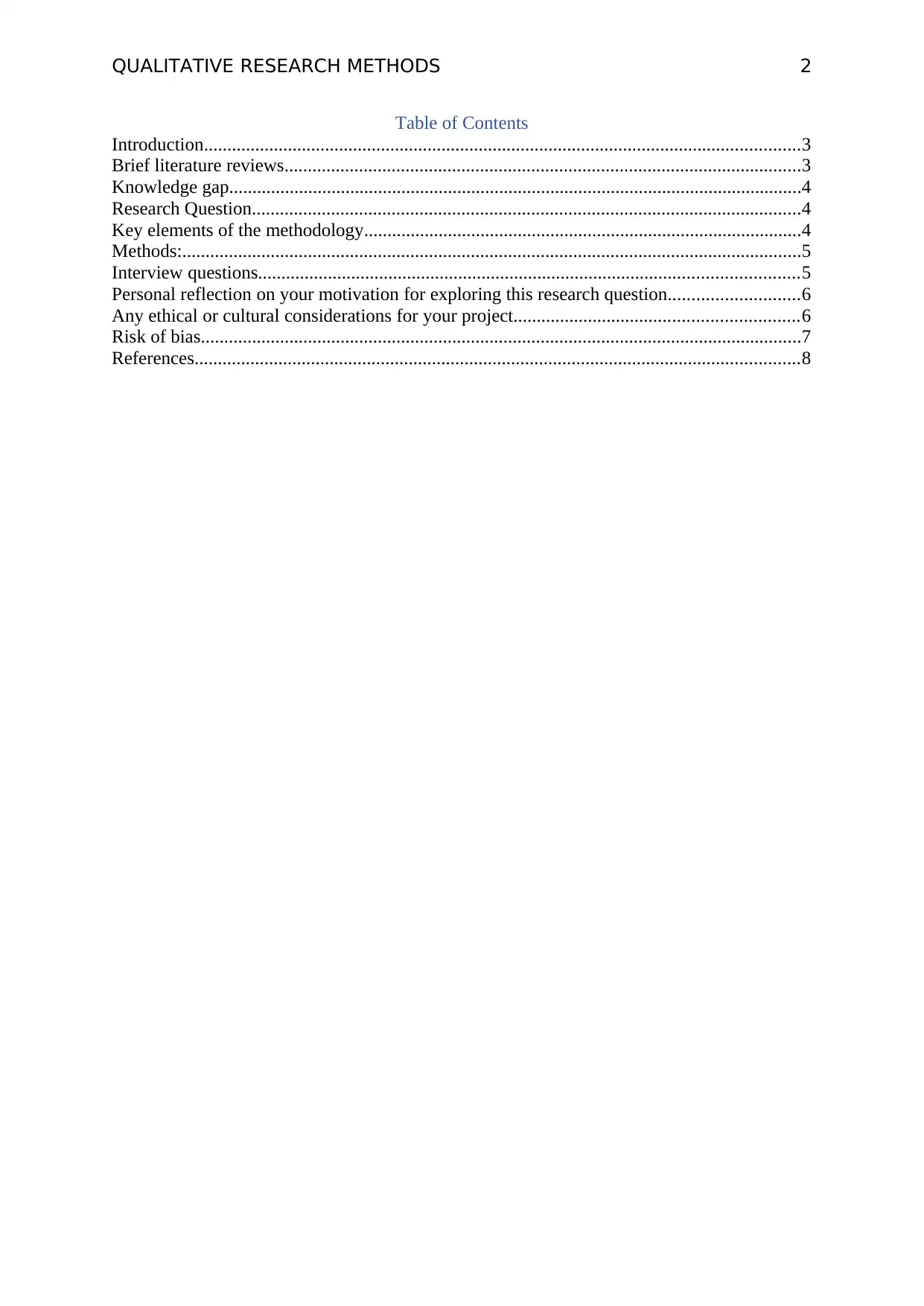
QUALITATIVE RESEARCH METHODS 2
Table of Contents
Introduction................................................................................................................................3
Brief literature reviews...............................................................................................................3
Knowledge gap...........................................................................................................................4
Research Question......................................................................................................................4
Key elements of the methodology..............................................................................................4
Methods:.....................................................................................................................................5
Interview questions....................................................................................................................5
Personal reflection on your motivation for exploring this research question............................6
Any ethical or cultural considerations for your project.............................................................6
Risk of bias.................................................................................................................................7
References..................................................................................................................................8
Table of Contents
Introduction................................................................................................................................3
Brief literature reviews...............................................................................................................3
Knowledge gap...........................................................................................................................4
Research Question......................................................................................................................4
Key elements of the methodology..............................................................................................4
Methods:.....................................................................................................................................5
Interview questions....................................................................................................................5
Personal reflection on your motivation for exploring this research question............................6
Any ethical or cultural considerations for your project.............................................................6
Risk of bias.................................................................................................................................7
References..................................................................................................................................8
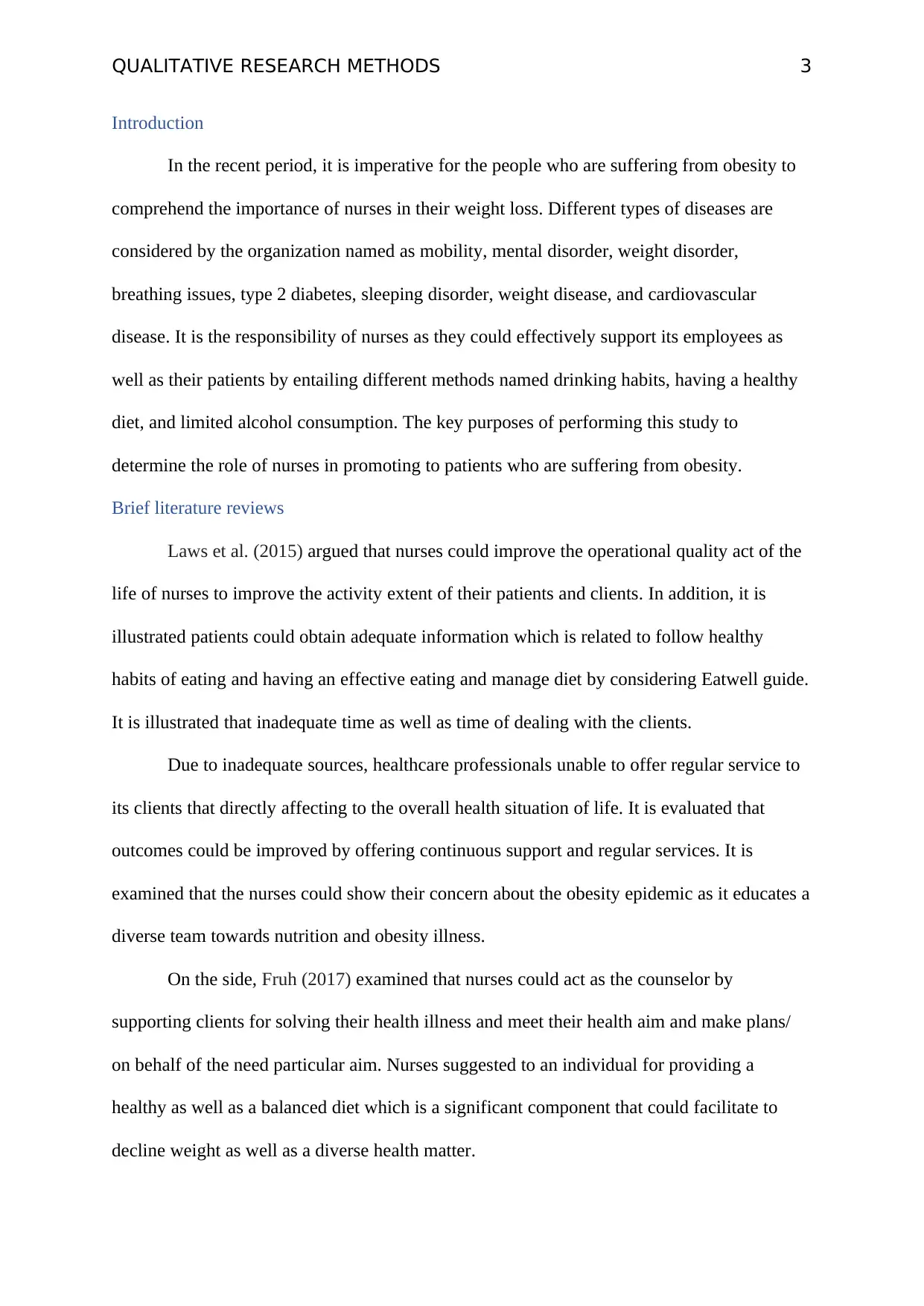
QUALITATIVE RESEARCH METHODS 3
Introduction
In the recent period, it is imperative for the people who are suffering from obesity to
comprehend the importance of nurses in their weight loss. Different types of diseases are
considered by the organization named as mobility, mental disorder, weight disorder,
breathing issues, type 2 diabetes, sleeping disorder, weight disease, and cardiovascular
disease. It is the responsibility of nurses as they could effectively support its employees as
well as their patients by entailing different methods named drinking habits, having a healthy
diet, and limited alcohol consumption. The key purposes of performing this study to
determine the role of nurses in promoting to patients who are suffering from obesity.
Brief literature reviews
Laws et al. (2015) argued that nurses could improve the operational quality act of the
life of nurses to improve the activity extent of their patients and clients. In addition, it is
illustrated patients could obtain adequate information which is related to follow healthy
habits of eating and having an effective eating and manage diet by considering Eatwell guide.
It is illustrated that inadequate time as well as time of dealing with the clients.
Due to inadequate sources, healthcare professionals unable to offer regular service to
its clients that directly affecting to the overall health situation of life. It is evaluated that
outcomes could be improved by offering continuous support and regular services. It is
examined that the nurses could show their concern about the obesity epidemic as it educates a
diverse team towards nutrition and obesity illness.
On the side, Fruh (2017) examined that nurses could act as the counselor by
supporting clients for solving their health illness and meet their health aim and make plans/
on behalf of the need particular aim. Nurses suggested to an individual for providing a
healthy as well as a balanced diet which is a significant component that could facilitate to
decline weight as well as a diverse health matter.
Introduction
In the recent period, it is imperative for the people who are suffering from obesity to
comprehend the importance of nurses in their weight loss. Different types of diseases are
considered by the organization named as mobility, mental disorder, weight disorder,
breathing issues, type 2 diabetes, sleeping disorder, weight disease, and cardiovascular
disease. It is the responsibility of nurses as they could effectively support its employees as
well as their patients by entailing different methods named drinking habits, having a healthy
diet, and limited alcohol consumption. The key purposes of performing this study to
determine the role of nurses in promoting to patients who are suffering from obesity.
Brief literature reviews
Laws et al. (2015) argued that nurses could improve the operational quality act of the
life of nurses to improve the activity extent of their patients and clients. In addition, it is
illustrated patients could obtain adequate information which is related to follow healthy
habits of eating and having an effective eating and manage diet by considering Eatwell guide.
It is illustrated that inadequate time as well as time of dealing with the clients.
Due to inadequate sources, healthcare professionals unable to offer regular service to
its clients that directly affecting to the overall health situation of life. It is evaluated that
outcomes could be improved by offering continuous support and regular services. It is
examined that the nurses could show their concern about the obesity epidemic as it educates a
diverse team towards nutrition and obesity illness.
On the side, Fruh (2017) examined that nurses could act as the counselor by
supporting clients for solving their health illness and meet their health aim and make plans/
on behalf of the need particular aim. Nurses suggested to an individual for providing a
healthy as well as a balanced diet which is a significant component that could facilitate to
decline weight as well as a diverse health matter.
⊘ This is a preview!⊘
Do you want full access?
Subscribe today to unlock all pages.

Trusted by 1+ million students worldwide
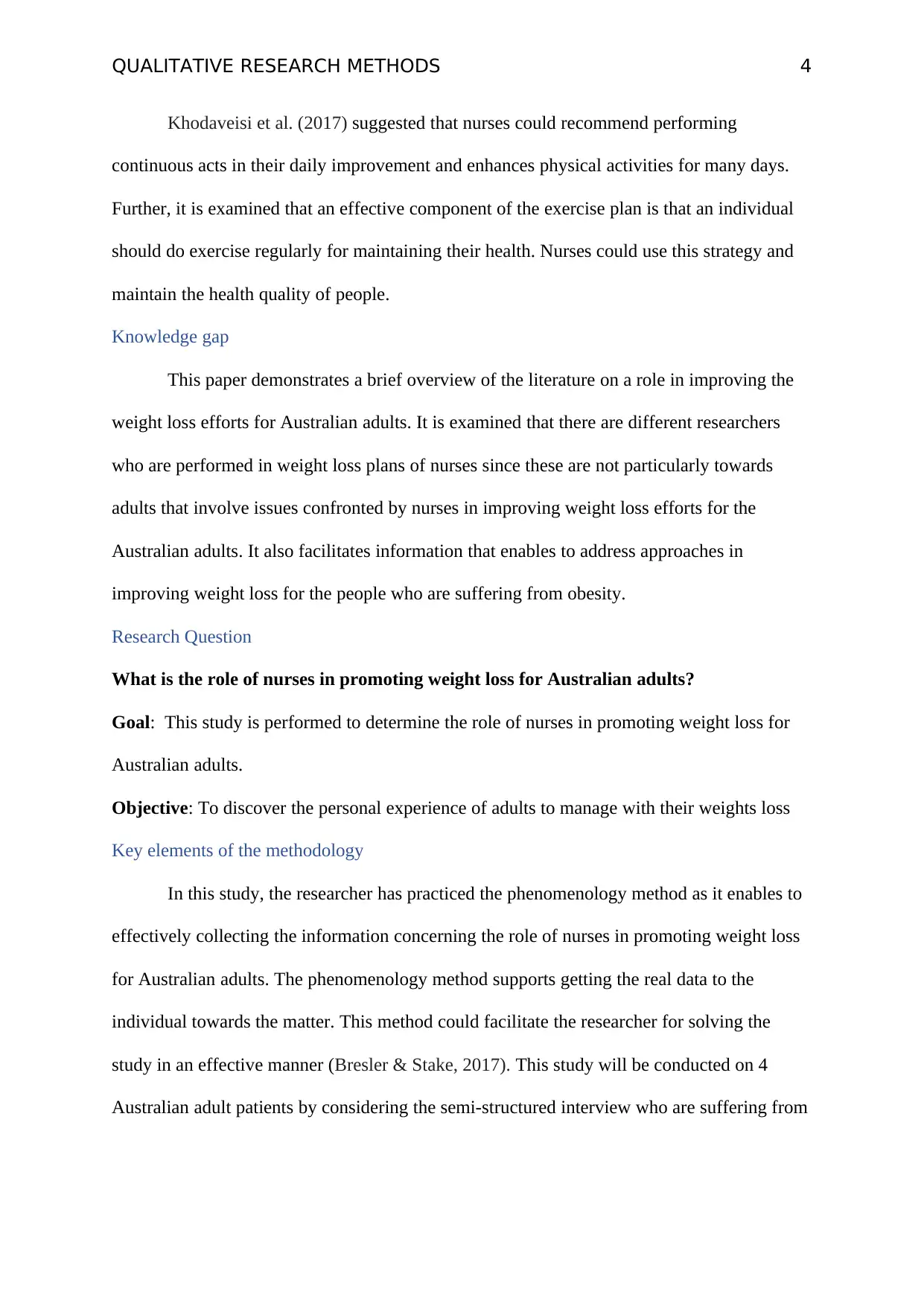
QUALITATIVE RESEARCH METHODS 4
Khodaveisi et al. (2017) suggested that nurses could recommend performing
continuous acts in their daily improvement and enhances physical activities for many days.
Further, it is examined that an effective component of the exercise plan is that an individual
should do exercise regularly for maintaining their health. Nurses could use this strategy and
maintain the health quality of people.
Knowledge gap
This paper demonstrates a brief overview of the literature on a role in improving the
weight loss efforts for Australian adults. It is examined that there are different researchers
who are performed in weight loss plans of nurses since these are not particularly towards
adults that involve issues confronted by nurses in improving weight loss efforts for the
Australian adults. It also facilitates information that enables to address approaches in
improving weight loss for the people who are suffering from obesity.
Research Question
What is the role of nurses in promoting weight loss for Australian adults?
Goal: This study is performed to determine the role of nurses in promoting weight loss for
Australian adults.
Objective: To discover the personal experience of adults to manage with their weights loss
Key elements of the methodology
In this study, the researcher has practiced the phenomenology method as it enables to
effectively collecting the information concerning the role of nurses in promoting weight loss
for Australian adults. The phenomenology method supports getting the real data to the
individual towards the matter. This method could facilitate the researcher for solving the
study in an effective manner (Bresler & Stake, 2017). This study will be conducted on 4
Australian adult patients by considering the semi-structured interview who are suffering from
Khodaveisi et al. (2017) suggested that nurses could recommend performing
continuous acts in their daily improvement and enhances physical activities for many days.
Further, it is examined that an effective component of the exercise plan is that an individual
should do exercise regularly for maintaining their health. Nurses could use this strategy and
maintain the health quality of people.
Knowledge gap
This paper demonstrates a brief overview of the literature on a role in improving the
weight loss efforts for Australian adults. It is examined that there are different researchers
who are performed in weight loss plans of nurses since these are not particularly towards
adults that involve issues confronted by nurses in improving weight loss efforts for the
Australian adults. It also facilitates information that enables to address approaches in
improving weight loss for the people who are suffering from obesity.
Research Question
What is the role of nurses in promoting weight loss for Australian adults?
Goal: This study is performed to determine the role of nurses in promoting weight loss for
Australian adults.
Objective: To discover the personal experience of adults to manage with their weights loss
Key elements of the methodology
In this study, the researcher has practiced the phenomenology method as it enables to
effectively collecting the information concerning the role of nurses in promoting weight loss
for Australian adults. The phenomenology method supports getting the real data to the
individual towards the matter. This method could facilitate the researcher for solving the
study in an effective manner (Bresler & Stake, 2017). This study will be conducted on 4
Australian adult patients by considering the semi-structured interview who are suffering from
Paraphrase This Document
Need a fresh take? Get an instant paraphrase of this document with our AI Paraphraser
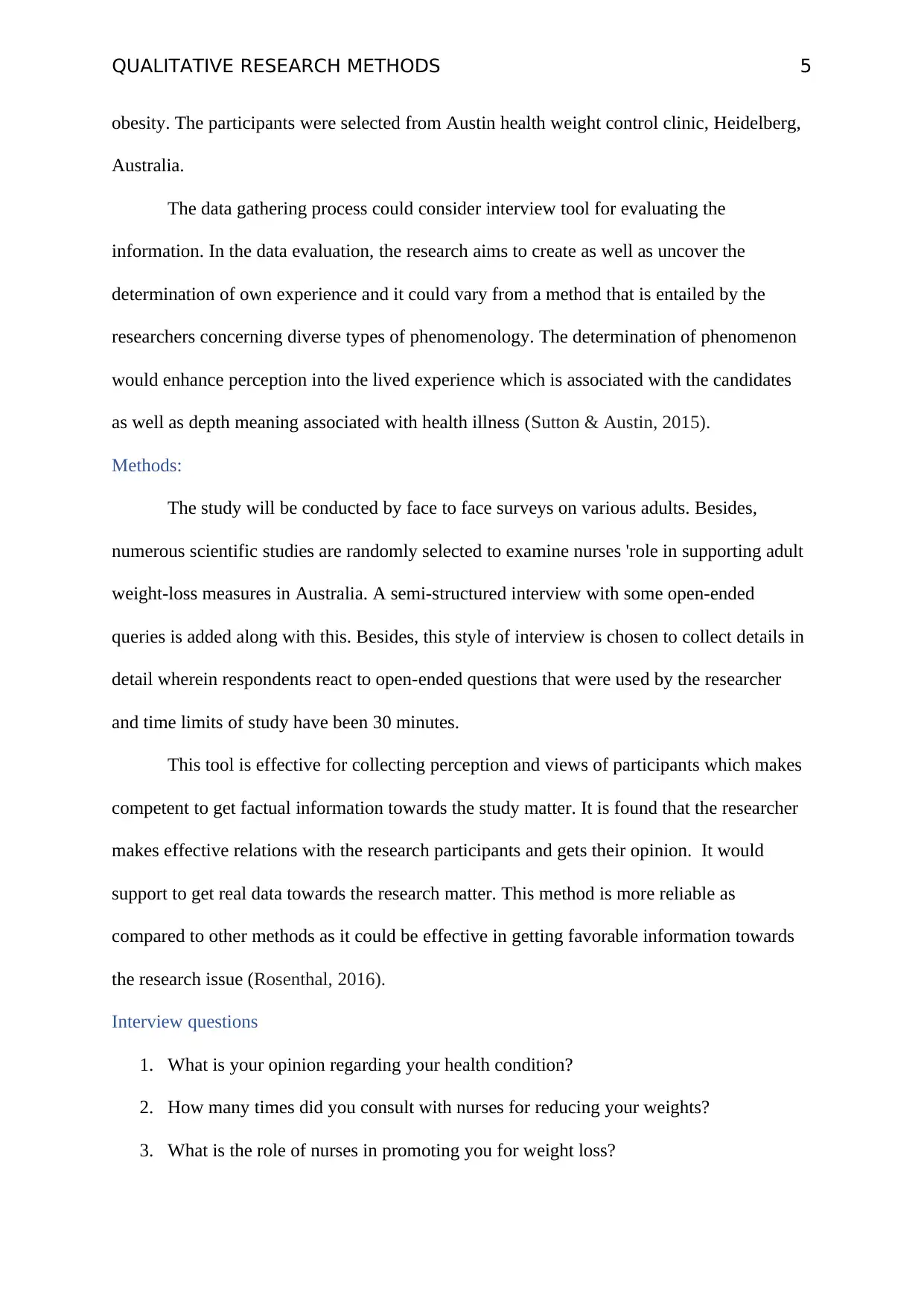
QUALITATIVE RESEARCH METHODS 5
obesity. The participants were selected from Austin health weight control clinic, Heidelberg,
Australia.
The data gathering process could consider interview tool for evaluating the
information. In the data evaluation, the research aims to create as well as uncover the
determination of own experience and it could vary from a method that is entailed by the
researchers concerning diverse types of phenomenology. The determination of phenomenon
would enhance perception into the lived experience which is associated with the candidates
as well as depth meaning associated with health illness (Sutton & Austin, 2015).
Methods:
The study will be conducted by face to face surveys on various adults. Besides,
numerous scientific studies are randomly selected to examine nurses 'role in supporting adult
weight-loss measures in Australia. A semi-structured interview with some open-ended
queries is added along with this. Besides, this style of interview is chosen to collect details in
detail wherein respondents react to open-ended questions that were used by the researcher
and time limits of study have been 30 minutes.
This tool is effective for collecting perception and views of participants which makes
competent to get factual information towards the study matter. It is found that the researcher
makes effective relations with the research participants and gets their opinion. It would
support to get real data towards the research matter. This method is more reliable as
compared to other methods as it could be effective in getting favorable information towards
the research issue (Rosenthal, 2016).
Interview questions
1. What is your opinion regarding your health condition?
2. How many times did you consult with nurses for reducing your weights?
3. What is the role of nurses in promoting you for weight loss?
obesity. The participants were selected from Austin health weight control clinic, Heidelberg,
Australia.
The data gathering process could consider interview tool for evaluating the
information. In the data evaluation, the research aims to create as well as uncover the
determination of own experience and it could vary from a method that is entailed by the
researchers concerning diverse types of phenomenology. The determination of phenomenon
would enhance perception into the lived experience which is associated with the candidates
as well as depth meaning associated with health illness (Sutton & Austin, 2015).
Methods:
The study will be conducted by face to face surveys on various adults. Besides,
numerous scientific studies are randomly selected to examine nurses 'role in supporting adult
weight-loss measures in Australia. A semi-structured interview with some open-ended
queries is added along with this. Besides, this style of interview is chosen to collect details in
detail wherein respondents react to open-ended questions that were used by the researcher
and time limits of study have been 30 minutes.
This tool is effective for collecting perception and views of participants which makes
competent to get factual information towards the study matter. It is found that the researcher
makes effective relations with the research participants and gets their opinion. It would
support to get real data towards the research matter. This method is more reliable as
compared to other methods as it could be effective in getting favorable information towards
the research issue (Rosenthal, 2016).
Interview questions
1. What is your opinion regarding your health condition?
2. How many times did you consult with nurses for reducing your weights?
3. What is the role of nurses in promoting you for weight loss?
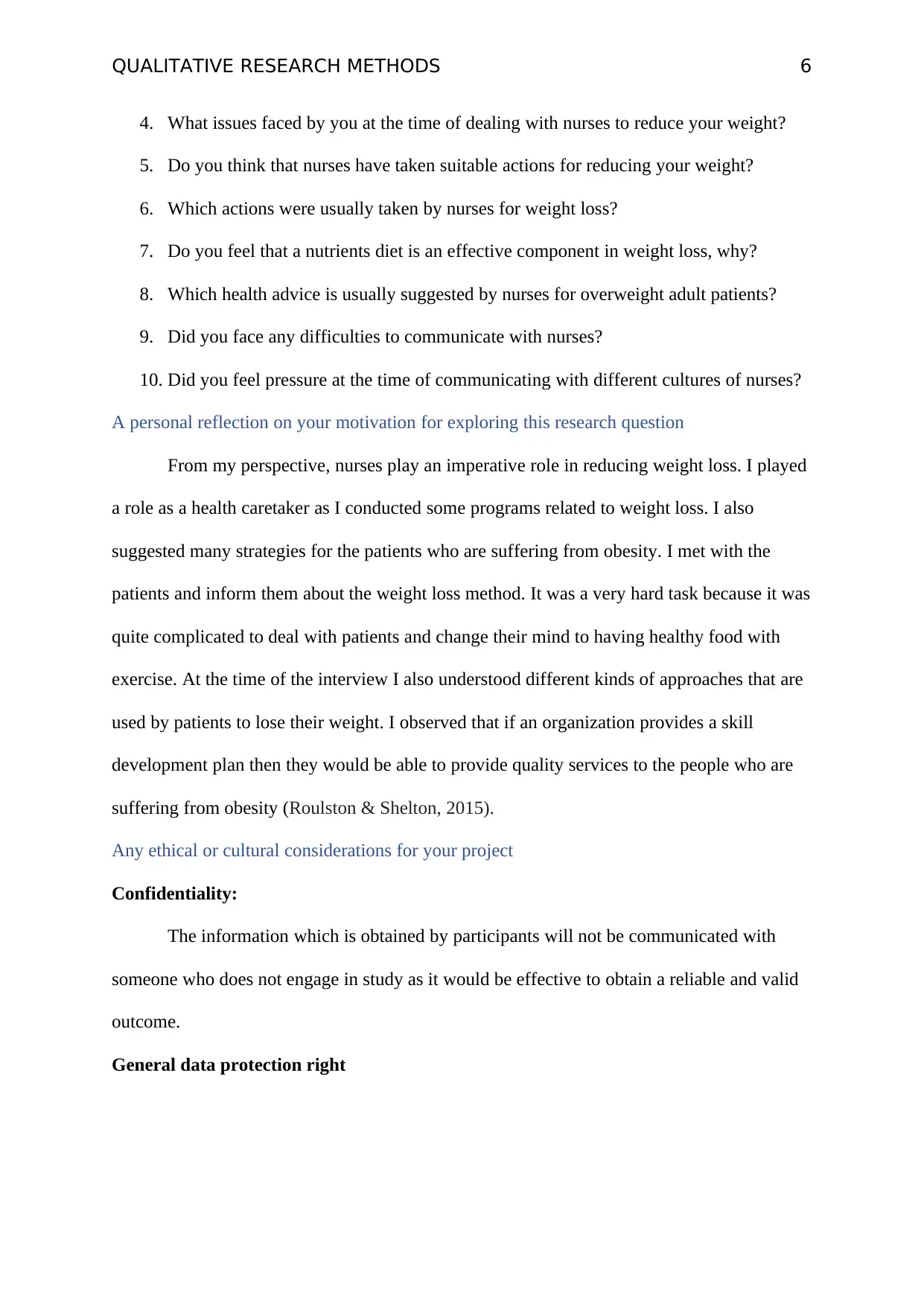
QUALITATIVE RESEARCH METHODS 6
4. What issues faced by you at the time of dealing with nurses to reduce your weight?
5. Do you think that nurses have taken suitable actions for reducing your weight?
6. Which actions were usually taken by nurses for weight loss?
7. Do you feel that a nutrients diet is an effective component in weight loss, why?
8. Which health advice is usually suggested by nurses for overweight adult patients?
9. Did you face any difficulties to communicate with nurses?
10. Did you feel pressure at the time of communicating with different cultures of nurses?
A personal reflection on your motivation for exploring this research question
From my perspective, nurses play an imperative role in reducing weight loss. I played
a role as a health caretaker as I conducted some programs related to weight loss. I also
suggested many strategies for the patients who are suffering from obesity. I met with the
patients and inform them about the weight loss method. It was a very hard task because it was
quite complicated to deal with patients and change their mind to having healthy food with
exercise. At the time of the interview I also understood different kinds of approaches that are
used by patients to lose their weight. I observed that if an organization provides a skill
development plan then they would be able to provide quality services to the people who are
suffering from obesity (Roulston & Shelton, 2015).
Any ethical or cultural considerations for your project
Confidentiality:
The information which is obtained by participants will not be communicated with
someone who does not engage in study as it would be effective to obtain a reliable and valid
outcome.
General data protection right
4. What issues faced by you at the time of dealing with nurses to reduce your weight?
5. Do you think that nurses have taken suitable actions for reducing your weight?
6. Which actions were usually taken by nurses for weight loss?
7. Do you feel that a nutrients diet is an effective component in weight loss, why?
8. Which health advice is usually suggested by nurses for overweight adult patients?
9. Did you face any difficulties to communicate with nurses?
10. Did you feel pressure at the time of communicating with different cultures of nurses?
A personal reflection on your motivation for exploring this research question
From my perspective, nurses play an imperative role in reducing weight loss. I played
a role as a health caretaker as I conducted some programs related to weight loss. I also
suggested many strategies for the patients who are suffering from obesity. I met with the
patients and inform them about the weight loss method. It was a very hard task because it was
quite complicated to deal with patients and change their mind to having healthy food with
exercise. At the time of the interview I also understood different kinds of approaches that are
used by patients to lose their weight. I observed that if an organization provides a skill
development plan then they would be able to provide quality services to the people who are
suffering from obesity (Roulston & Shelton, 2015).
Any ethical or cultural considerations for your project
Confidentiality:
The information which is obtained by participants will not be communicated with
someone who does not engage in study as it would be effective to obtain a reliable and valid
outcome.
General data protection right
⊘ This is a preview!⊘
Do you want full access?
Subscribe today to unlock all pages.

Trusted by 1+ million students worldwide
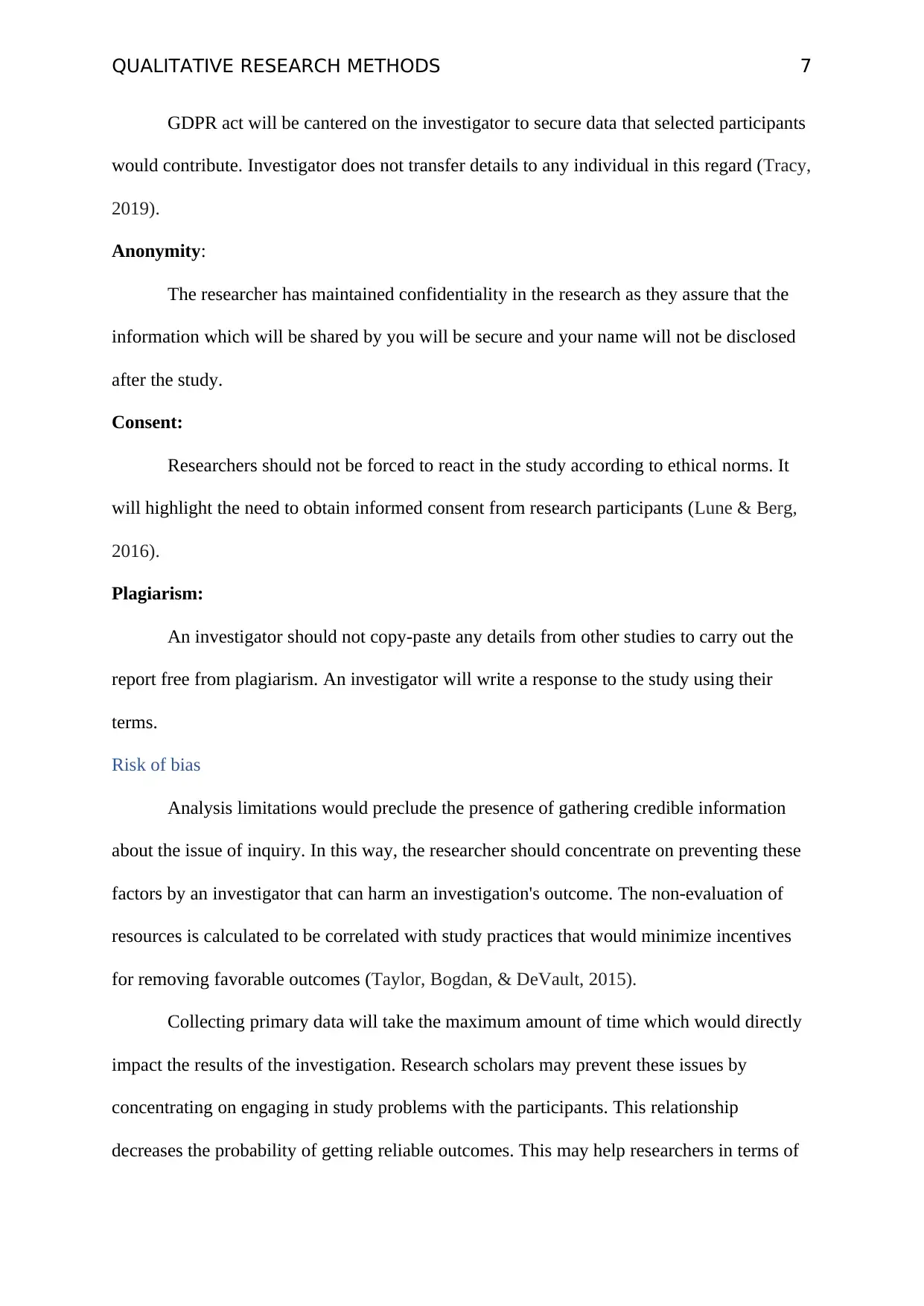
QUALITATIVE RESEARCH METHODS 7
GDPR act will be cantered on the investigator to secure data that selected participants
would contribute. Investigator does not transfer details to any individual in this regard (Tracy,
2019).
Anonymity:
The researcher has maintained confidentiality in the research as they assure that the
information which will be shared by you will be secure and your name will not be disclosed
after the study.
Consent:
Researchers should not be forced to react in the study according to ethical norms. It
will highlight the need to obtain informed consent from research participants (Lune & Berg,
2016).
Plagiarism:
An investigator should not copy-paste any details from other studies to carry out the
report free from plagiarism. An investigator will write a response to the study using their
terms.
Risk of bias
Analysis limitations would preclude the presence of gathering credible information
about the issue of inquiry. In this way, the researcher should concentrate on preventing these
factors by an investigator that can harm an investigation's outcome. The non-evaluation of
resources is calculated to be correlated with study practices that would minimize incentives
for removing favorable outcomes (Taylor, Bogdan, & DeVault, 2015).
Collecting primary data will take the maximum amount of time which would directly
impact the results of the investigation. Research scholars may prevent these issues by
concentrating on engaging in study problems with the participants. This relationship
decreases the probability of getting reliable outcomes. This may help researchers in terms of
GDPR act will be cantered on the investigator to secure data that selected participants
would contribute. Investigator does not transfer details to any individual in this regard (Tracy,
2019).
Anonymity:
The researcher has maintained confidentiality in the research as they assure that the
information which will be shared by you will be secure and your name will not be disclosed
after the study.
Consent:
Researchers should not be forced to react in the study according to ethical norms. It
will highlight the need to obtain informed consent from research participants (Lune & Berg,
2016).
Plagiarism:
An investigator should not copy-paste any details from other studies to carry out the
report free from plagiarism. An investigator will write a response to the study using their
terms.
Risk of bias
Analysis limitations would preclude the presence of gathering credible information
about the issue of inquiry. In this way, the researcher should concentrate on preventing these
factors by an investigator that can harm an investigation's outcome. The non-evaluation of
resources is calculated to be correlated with study practices that would minimize incentives
for removing favorable outcomes (Taylor, Bogdan, & DeVault, 2015).
Collecting primary data will take the maximum amount of time which would directly
impact the results of the investigation. Research scholars may prevent these issues by
concentrating on engaging in study problems with the participants. This relationship
decreases the probability of getting reliable outcomes. This may help researchers in terms of
Paraphrase This Document
Need a fresh take? Get an instant paraphrase of this document with our AI Paraphraser
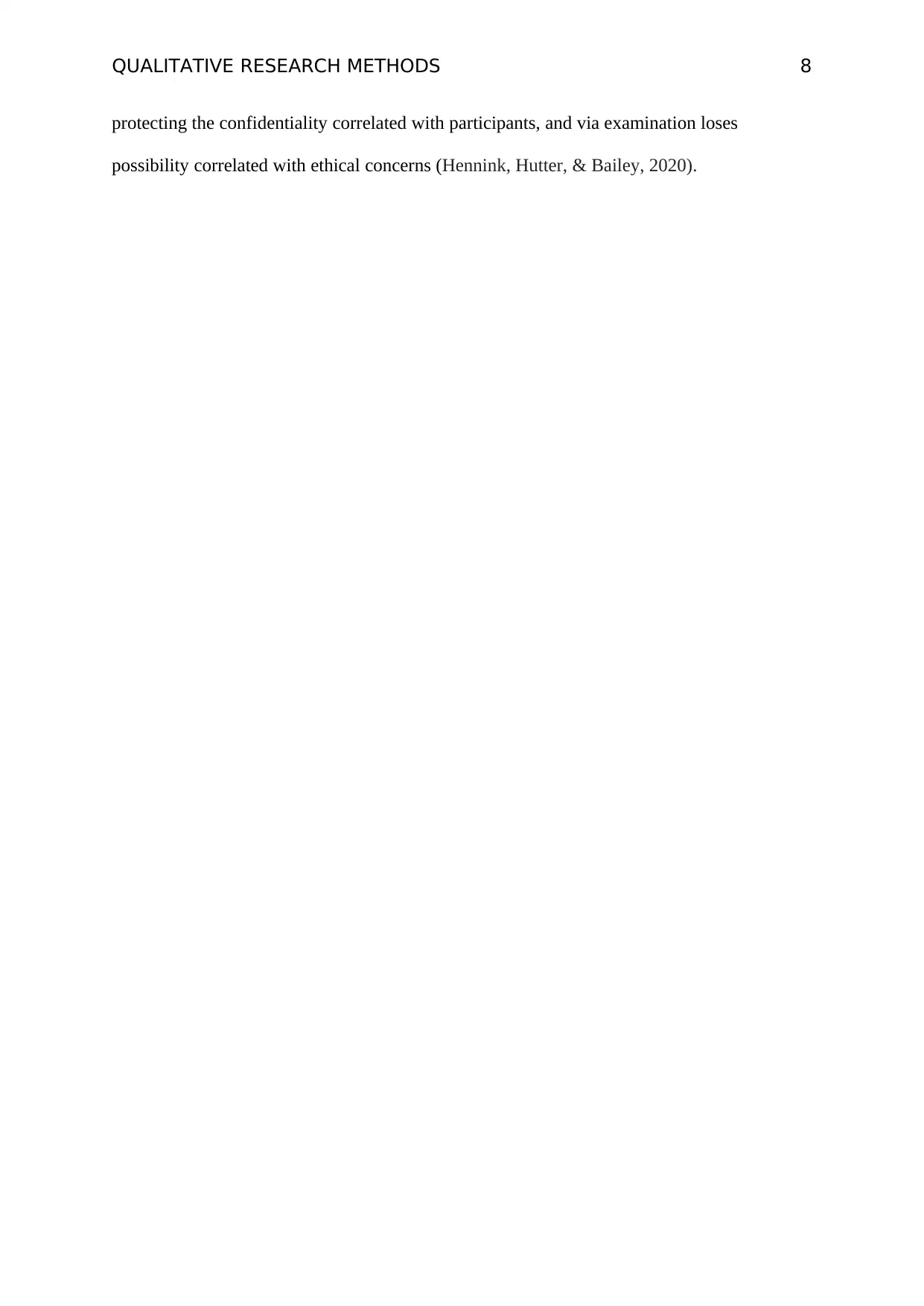
QUALITATIVE RESEARCH METHODS 8
protecting the confidentiality correlated with participants, and via examination loses
possibility correlated with ethical concerns (Hennink, Hutter, & Bailey, 2020).
protecting the confidentiality correlated with participants, and via examination loses
possibility correlated with ethical concerns (Hennink, Hutter, & Bailey, 2020).
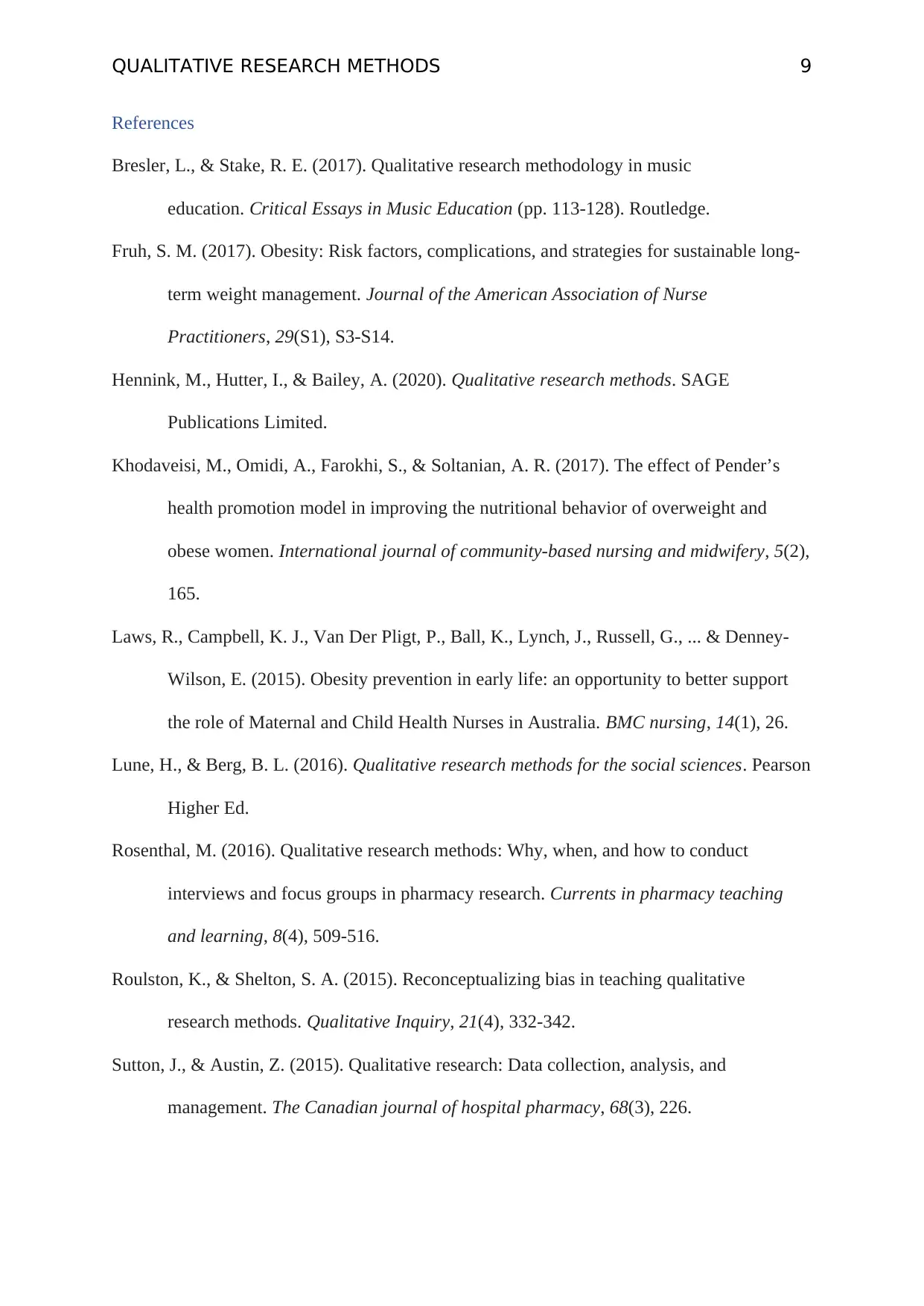
QUALITATIVE RESEARCH METHODS 9
References
Bresler, L., & Stake, R. E. (2017). Qualitative research methodology in music
education. Critical Essays in Music Education (pp. 113-128). Routledge.
Fruh, S. M. (2017). Obesity: Risk factors, complications, and strategies for sustainable long‐
term weight management. Journal of the American Association of Nurse
Practitioners, 29(S1), S3-S14.
Hennink, M., Hutter, I., & Bailey, A. (2020). Qualitative research methods. SAGE
Publications Limited.
Khodaveisi, M., Omidi, A., Farokhi, S., & Soltanian, A. R. (2017). The effect of Pender’s
health promotion model in improving the nutritional behavior of overweight and
obese women. International journal of community-based nursing and midwifery, 5(2),
165.
Laws, R., Campbell, K. J., Van Der Pligt, P., Ball, K., Lynch, J., Russell, G., ... & Denney-
Wilson, E. (2015). Obesity prevention in early life: an opportunity to better support
the role of Maternal and Child Health Nurses in Australia. BMC nursing, 14(1), 26.
Lune, H., & Berg, B. L. (2016). Qualitative research methods for the social sciences. Pearson
Higher Ed.
Rosenthal, M. (2016). Qualitative research methods: Why, when, and how to conduct
interviews and focus groups in pharmacy research. Currents in pharmacy teaching
and learning, 8(4), 509-516.
Roulston, K., & Shelton, S. A. (2015). Reconceptualizing bias in teaching qualitative
research methods. Qualitative Inquiry, 21(4), 332-342.
Sutton, J., & Austin, Z. (2015). Qualitative research: Data collection, analysis, and
management. The Canadian journal of hospital pharmacy, 68(3), 226.
References
Bresler, L., & Stake, R. E. (2017). Qualitative research methodology in music
education. Critical Essays in Music Education (pp. 113-128). Routledge.
Fruh, S. M. (2017). Obesity: Risk factors, complications, and strategies for sustainable long‐
term weight management. Journal of the American Association of Nurse
Practitioners, 29(S1), S3-S14.
Hennink, M., Hutter, I., & Bailey, A. (2020). Qualitative research methods. SAGE
Publications Limited.
Khodaveisi, M., Omidi, A., Farokhi, S., & Soltanian, A. R. (2017). The effect of Pender’s
health promotion model in improving the nutritional behavior of overweight and
obese women. International journal of community-based nursing and midwifery, 5(2),
165.
Laws, R., Campbell, K. J., Van Der Pligt, P., Ball, K., Lynch, J., Russell, G., ... & Denney-
Wilson, E. (2015). Obesity prevention in early life: an opportunity to better support
the role of Maternal and Child Health Nurses in Australia. BMC nursing, 14(1), 26.
Lune, H., & Berg, B. L. (2016). Qualitative research methods for the social sciences. Pearson
Higher Ed.
Rosenthal, M. (2016). Qualitative research methods: Why, when, and how to conduct
interviews and focus groups in pharmacy research. Currents in pharmacy teaching
and learning, 8(4), 509-516.
Roulston, K., & Shelton, S. A. (2015). Reconceptualizing bias in teaching qualitative
research methods. Qualitative Inquiry, 21(4), 332-342.
Sutton, J., & Austin, Z. (2015). Qualitative research: Data collection, analysis, and
management. The Canadian journal of hospital pharmacy, 68(3), 226.
⊘ This is a preview!⊘
Do you want full access?
Subscribe today to unlock all pages.

Trusted by 1+ million students worldwide
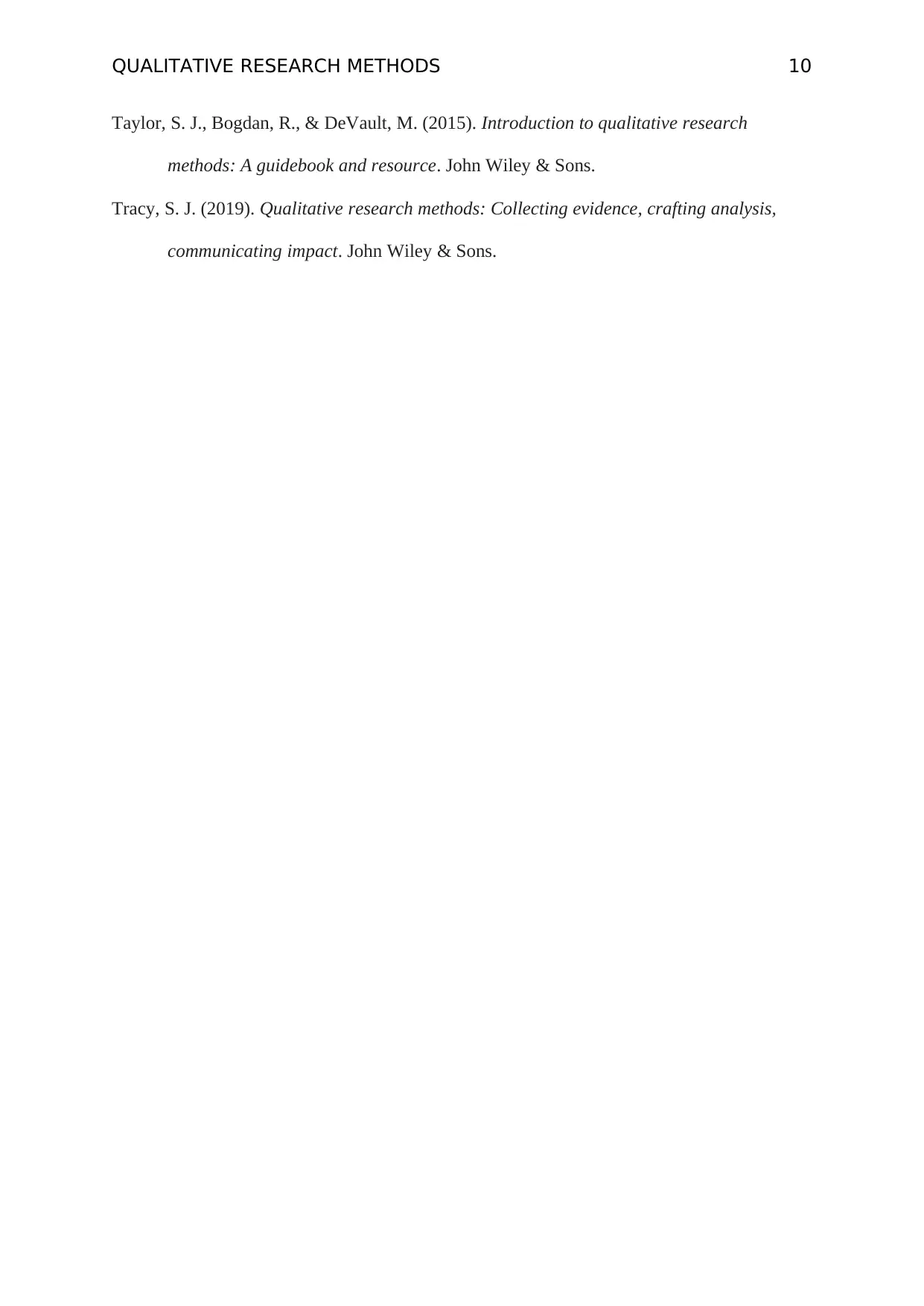
QUALITATIVE RESEARCH METHODS 10
Taylor, S. J., Bogdan, R., & DeVault, M. (2015). Introduction to qualitative research
methods: A guidebook and resource. John Wiley & Sons.
Tracy, S. J. (2019). Qualitative research methods: Collecting evidence, crafting analysis,
communicating impact. John Wiley & Sons.
Taylor, S. J., Bogdan, R., & DeVault, M. (2015). Introduction to qualitative research
methods: A guidebook and resource. John Wiley & Sons.
Tracy, S. J. (2019). Qualitative research methods: Collecting evidence, crafting analysis,
communicating impact. John Wiley & Sons.
1 out of 10
Related Documents
Your All-in-One AI-Powered Toolkit for Academic Success.
+13062052269
info@desklib.com
Available 24*7 on WhatsApp / Email
![[object Object]](/_next/static/media/star-bottom.7253800d.svg)
Unlock your academic potential
Copyright © 2020–2025 A2Z Services. All Rights Reserved. Developed and managed by ZUCOL.





